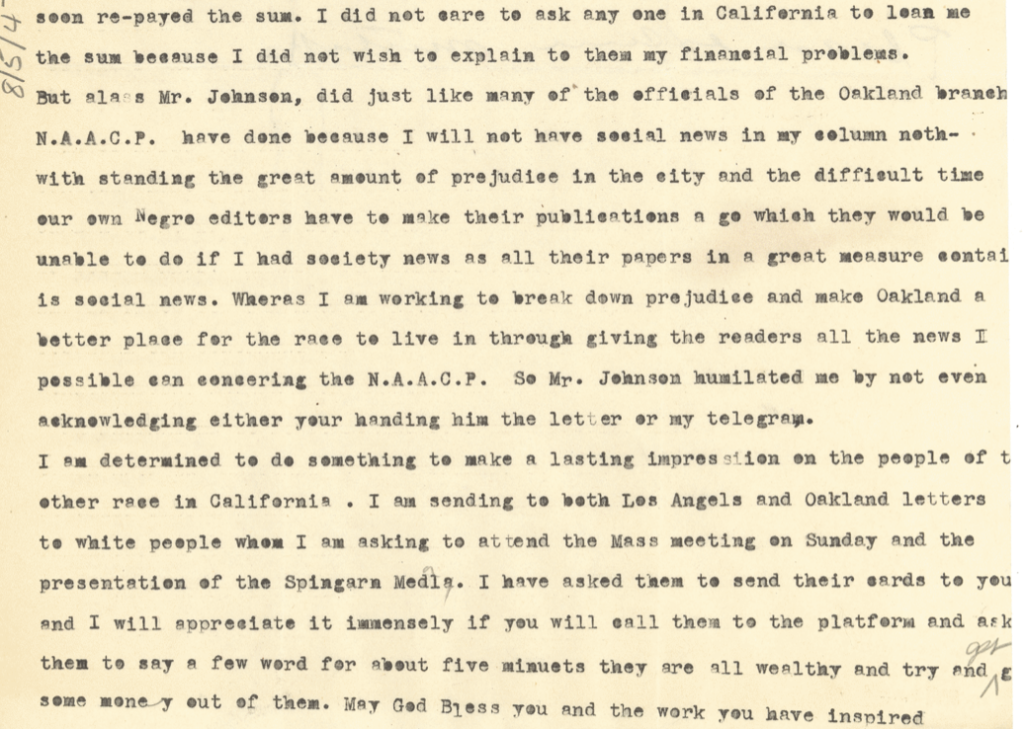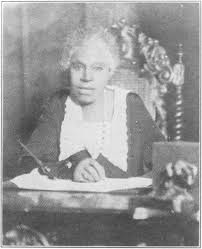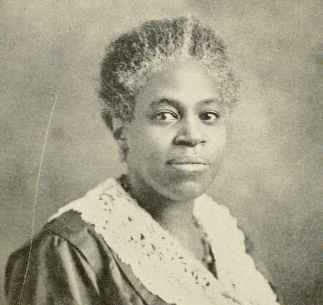Delilah Leontium Beasley, born on September 9, 1867 in Cincinnati, Ohio, was a scholar, pioneer, and powerhouse. She was a devout Roman Catholic with a strong sense of purpose in spite of her challenges both physically and financially. Even with the odds stacked against her she was incredibly productive both as a historian and changemaker. She was a vanguard: a writer, speaker, and activist. She had a unique approach of using rhetoric to counteract hateful, racist rhetoric through praising progress in race relations. She was also a physical therapist, nurse, and masseuse.
Beasley left Ohio to take a job as a nurse in Oakland in 1910 at the age of 39. In 1925, Beasley became the first black woman to be a columnist for the Oakland Tribune. As a Tribune writer, Beasley had a radical impact on racial reform in Oakland. Her column was called Activities Among Negroes. She used her position and this platform to influence the way that the black community was both perceived and discussed. She was building positive race relations by every means possible. She once wrote in her column that “Oakland is one of the greatest cities in America today in regard to race relations.” Beasley lived in Oakland until her death in 1934.
Beasley’s father was well educated. She attended black public schools in Cincinnati but had to abandon her formal education to support herself when both of her parents died. Having expressed interest from a very young age, she studied journalism under the guidance of Daniel Rudd, a well-known newspaper publisher in Cincinnati. After moving to Oakland, she attended history lectures and researched at UC Berkeley. Her interest in history led her to write articles documenting the history of California’s black population. She became an expert in archival research, tracking down diaries and personal papers and even conducting oral histories with older black residents. She struggled with grammar and commonly had her pieces edited before publication.
Her career writing for newspapers started at the age of 12 when she wrote briefly about church and social activities in Cincinnati for the Cleveland Gazette. Three years later, she published her first column called Mosaics in the Sunday edition of The Cincinnati Enquirer. If she had continued to work as a physical therapist, she would have afforded a comfortable middle-class life, but she insisted on devoting her life to her activism. She would travel at her own expense to be able to report on important events within the black community.

The Oakland Sunshine (1897-1923) was a weekly African-American newspaper. It was founded and edited by John A. Wilds, who was the first African-American civil servant in Oakland as City Hall’s custodian and night watchman. Delilah Beasley wrote for the Oakland Sunshine in 1915.

Designated heading for Delilah Beasley’s Oakland Tribune column.
William Knowland, a California politician and an assistant publisher for the Tribune, convinced Beasley to write for the Tribune. It was at Beasley’s urging that Assemblyman William Knowland and Assemblyman Frederick M. Roberts introduced an anti-lynching bill, which passed unanimously in both houses of the California Legislature. The Tribune was a platform of influence at the time. Her position enhanced her self-esteem and pride. It was a place for Beasley to do what she believed to be God’s work. She wrote her column until her death in 1934.
Haunts:
- Tribune Tower, 409 13th Street, Oakland, CA 94612.

Tribune Tower, 409 13th Street, Oakland, CA 94612.
(Source: https://news.theregistrysf.com/hff-arranges-23mm-financing-historic-tribune-tower-oakland/)
- Delilah Beasley’s residence, 705 34th Street, Oakland, CA 94609. Beasley lived in poverty, never having saved more than $100. Her weekly salary at the Oakland Tribune was just $10 (Streitmatter 79). She rented a room in a Queen Anne-style duplex on 34th Street. She struggled with ongoing health issues and would likely have spent a lot of time at her residence during especially difficult periods.

705 34th Street, Oakland, CA 94609
(Source: https://oac.cdlib.org/findaid/ark:/13030/c8kd23bd/entire_text/)
- The Cathedral of Saint Francis de Sales, 2100 Martin Luther King, Jr. Way, Oakland, CA 94612. As a devout Roman Catholic her faith was a tremendous driving force for her mission and tireless work ethic in spite of her poor health. The Cathedral of Saint Francis de Sales is where she attended services. She belonged to many civic organizations, which often overlapped with her church community. This church is where her funeral was held. At her funeral, mourners and community leaders spoke of turning her columns into a book, which never materialized.

37°48′40″N 122°16′22″W / 37.811039°N 122.272747°W / 37.811039; -122.272747
~ by Sara Lahey ~
External Links:
‘Delilah L. Beasley and the Trail She Blazed’, California State University, Northridge, 19 February 2019, https://library.csun.edu/SCA/Peek-in-the-Stacks/delilah-beasley
Beasley, Delilah. Activities Among Negroes. Oakland Tribune, 4 Oct. 1925, p. B-4.
—. Letter from Delilah L. Beasley to W.E.B. Du Bois. Received by W.E.B. Du Bois, 16 June 1928. https://www.digitalcommonwealth.org/search/commonwealth-oai:9s163d73b.
—. The Negro Trail Blazers of California. Los Angeles, Times-Mirror Printing and Binding House, 1919.
Crouchett, Lorraine Jacobs. Delilah Leontium Beasley: Oakland’s Crusading Journalist. El Cerrito, Downey Place Publishing House, 1990.
Streitmatter, Rodger. Raising Her Voice: African-American Women Journalists Who Changed History. Lexington, The University Press of Kentucky, 1994.



(Source: Digitalcommonwealth.org)
“Wher[e]as I am working to break down prejudice and make Oakland a better place for the race to live in through giving the readers all the news. . . .” Delilah Beasley (1928)
Image 2: Beasley in her later years behind a desk.
Image 3: A clipping of Delilah’s obituary in the Oakland Tribune.
